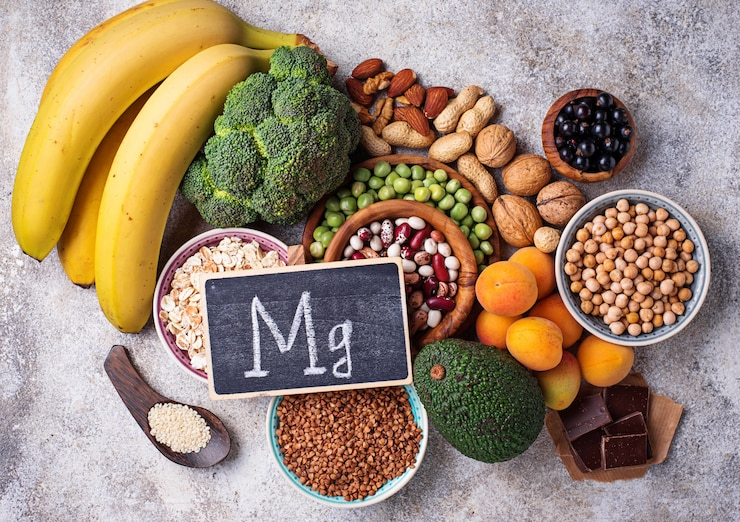What are the Magnesium benefits for Women?



The last couple of years has seen a considerable rise in chronic disease and nutritional deficiency. The covid 19 pandemic has further aggravated the two health conditions, taking a toll on the health of individuals all over the world. A healthy, balanced, and nutritional diet is necessary to keep the fuel of your body running. An obvious lack of nutritional food among individuals of all populations has significantly affected people's health worldwide.
Magnesium is a major mineral found in the body. Originally present in soil or air, we get magnesium from plants, fishes, and meat. Being the fourth most abundant mineral in the body, magnesium plays a significant role as a cofactor for almost 300 enzymes involved in vital metabolic reactions in the body. After potassium, it is the second most active intracellular cation in the body.
Protein synthesis, energy production, nerve function, DNA and RNA synthesis, muscle contraction, and controlling blood pressure are some important processes in which magnesium plays a significant role. Therefore, maintaining optimum levels of magnesium in your body is necessary.
It is recommended that an adult woman consume a daily intake of 270mg of magnesium daily, whereas a pregnant woman would require 350-360mg daily. Whole grains, seeds, nuts, leafy greens, fruits, fish, meat, and dairy products are good sources of magnesium. Drinking mineralized water can help to get almost 10% of the daily magnesium quota from water.

On the other hand, magnesium deficiency has often been overlooked, with several people suffering from diseases and health conditions as a result of Hypomagnesemia
Hypomagnesemia is the term used to describe low magnesium levels in the blood. It is characterized by electrolyte disturbance in the body with less than 1.46mg/dl.
Hypomagnesemia may be attributed to the following:
Reduced oral intake of magnesium
Alcohol abuse
Poor absorption due to gastrointestinal disorders or diarrhoea
Underlying medical conditions such as bone disease, pancreatitis, surgery involving the digestive tract, and renal-related health problems.
Consuming certain medications like digitalis, proton pump inhibitors, amphotericin B and some chemotherapeutic drugs may cause low levels of magnesium in the blood.
A hereditary factor may also be responsible for hypomagnesemia.
Depending on the severity of decreased magnesium levels, hypomagnesemia may manifest in several symptoms that affect various organ systems.
Some of the common signs and symptoms of hypomagnesemia include:
Tremors
Delirium
Low Calcium levels
Reduced Potassium levels
Hypoparathyroidism
ECG changes
Increased triglycerides
Increased risk of heart disease
Diabetes
Hypermagnesemia is the increase in serum magnesium levels in the blood. Although hypermagnesemia may rarely occur, it usually affects persons who are admitted to the hospital with an underlying serious health condition. It, therefore, most commonly has an iatrogenic cause.
Iatrogenic cause
Reduced levels of thyroid hormone
Lithium therapy
Addison’s disease
Depending on the severity of hypermagnesemia, your symptoms may vary. Some of the common symptoms of hypermagnesemia are listed below (symptoms listed in ascending order of severity of hypermagnesemia)
Nausea
Vomiting
Low blood pressure
Retention of urine
Heart blockage
Respiratory depression
Paralysis
After taking your clinical history, your doctor may recommend a magnesium blood test to evaluate your serum magnesium levels. If you are doubtful of hypomagnesemia, your doctor may also advise you to undergo serum calcium, phosphate, and blood glucose level tests along with a kidney function test. An ECG may also be recommended. If required, you may consider taking our Welzo Magnesium Blood test to assess your serum magnesium levels.

Globally, the majority of women experience what is called premenstrual syndrome. Some women suffer from severe PMS throughout their reproductive life. Magnesium supplementation has been proven to alleviate the abdominal cramps and pelvic pain associated with PMS. Studies have shown that people suffering from PMS have lower levels of magnesium in their bodies compared to women who do not suffer from premenstrual symptoms. It has been observed that magnesium supplements taken along with vitamin B6 supplements can significantly reduce your PMS. If you are struggling with severe PMS, you may benefit by taking our Wellwoman Original supplements that contain magnesium and vitamin B6, B12, iron, evening primrose oil, and starflower oil.
60% of the magnesium stored in your body is in the bones. Magnesium is known to prevent several bone-related health problems. It plays a vital role in maintaining the blood supply to the bone. It also helps to maintain vitamin D, calcium, and parathyroid hormone levels, which are important for bone health. Low levels of magnesium have resulted in reduced bone density among women. Whereas adequate levels of magnesium in the body help maintain the mineral density of bone. Magnesium supplements are especially beneficial for postmenopausal women who are more prone to osteoporosis.
Magnesium is an important cofactor in carbohydrate metabolism. It helps to maintain the function of insulin in the body. Having sufficient magnesium levels in the body has been observed to prevent diabetes.
Women suffering from frequent migraine attacks have been observed to have lower levels of serum magnesium in the blood. Having adequate magnesium levels in your body can help to reduce the severity and frequency of headaches associated with migraine.
Due to its role in maintaining bone health and preventing headaches and cardiovascular diseases, menopausal and postmenopausal women can significantly benefit from magnesium supplements. Magnesium levels are also maintained in inverse relation to your reproductive hormones. It makes up for the decreasing levels of estrogen hormone during menopause by maintaining smooth muscle and bone health.
Women suffering from PCOS have been observed to have low magnesium levels in the body. Its anti-inflammatory and antioxidative properties have proven beneficial to women suffering from PCOS.
Having adequate magnesium levels during pregnancy is important for you and your baby’s health. Magnesium deficiency has been associated with high blood pressure, early labour, and retarded intrauterine growth. Therefore, sufficient magnesium levels through diet or supplements help to prevent gestational preeclampsia and preterm birth.
The benefits of magnesium are far and wide. Although magnesium is an essential nutrient for both men and women, it is particularly a women-friendly mineral. This is because it can prevent you from several hormonal diseases and symptoms associated with your reproductive cycle. Consuming magnesium-rich foods or supplements can help make the journey through the various phases of a woman’s reproductive life easier.










Plus get the inside scoop on our latest content and updates in our monthly newsletter.